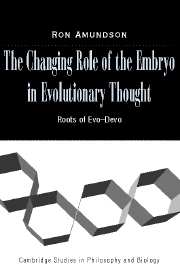Book contents
- Frontmatter
- Contents
- Acknowledgments
- 1 Introduction
- PART I DARWIN'S CENTURY: BEYOND THE ESSENTIALISM STORY
- PART II NEO-DARWIN'S CENTURY: EXPLAINING THE ABSENCE AND THE REAPPEARANCE OF DEVELOPMENT IN EVOLUTIONARY THOUGHT
- 7 The Invention of Heredity
- 8 Basics of the Evolutionary Synthesis
- 9 Structuralist Reactions to the Synthesis
- 10 The Synthesis Matures
- 11 Recent Debates and the Continuing Tension
- References
- Index
10 - The Synthesis Matures
Published online by Cambridge University Press: 05 June 2012
- Frontmatter
- Contents
- Acknowledgments
- 1 Introduction
- PART I DARWIN'S CENTURY: BEYOND THE ESSENTIALISM STORY
- PART II NEO-DARWIN'S CENTURY: EXPLAINING THE ABSENCE AND THE REAPPEARANCE OF DEVELOPMENT IN EVOLUTIONARY THOUGHT
- 7 The Invention of Heredity
- 8 Basics of the Evolutionary Synthesis
- 9 Structuralist Reactions to the Synthesis
- 10 The Synthesis Matures
- 11 Recent Debates and the Continuing Tension
- References
- Index
Summary
THE DARWIN CENTENNIAL CELEBRATION
The 1950s were a period of consolidation for the Evolutionary Synthesis. Or a period of increasing self-awareness as a movement … or a period during which those who wished to present evolutionary biology a cohesive body of scientific knowledge were more successful in doing so. A conference held in Princeton in 1947 had resulted in an unusual amount of agreement on theoretical issues, and this encouraged the feeling of unity (Davis 1949). However, a note of discord appeared in an Oxford Symposium on evolution in 1951. Waddington gave a paper entitled “Epigenetics and Evolution.” He said that the achievements of “mathematical theorists on the one hand and experimental naturalists on the other” had been so striking that evolutionary scientists might have been seen to have “reached their goal with some degree of finality” (Waddington 1953: 186). Not so, said Waddington. The achievements of mathematical and experimental geneticists were less impressive to him. Embryologists, including Goldschmidt, Schmalhausen, and Dalcq, had continued to raise questions. The process of ontogenetic development had been neglected, and without it the Synthesis must remain incomplete. Waddington called attention to the dichotomy of genotype and phenotype, and he claimed that it ignored the epigenotype, Waddington's term for the processes of ontogeny.
- Type
- Chapter
- Information
- The Changing Role of the Embryo in Evolutionary ThoughtRoots of Evo-Devo, pp. 198 - 212Publisher: Cambridge University PressPrint publication year: 2005



